Question: How have police officers in Hawaii adapted to the use of body cameras, security cameras and people with cellphones shooting video at crime scenes? How does SHOPO guide its membership on this issue, and adherence to police department procedures in general?
Answer: Security cameras and the use of video capabilities are valuable tools in helping to catch criminals who run rampant in our community. What is really needed to address the growing trend of violence and criminal activity is having more police officers in our communities.
Police departments are responsible for training our officers on the use of body-worn cameras (BWC). SHOPO supports the Honolulu Police Department’s BWC policies. We understand that BWCs provide a specific angle of a complex crime scene because it is positioned in a way that does not always capture what the police officer observes, especially during dynamic encounters with violent criminals who spiral out of control in a matter of seconds.
Are you concerned that the shootings of Iremamber Sykap and Lindani Myeni could result in an erosion of public trust in police departments and their officers?
Those two incidents are tragedies for all those involved. We are aware that some have compared these incidents to other shootings on the mainland. Based on the outpouring of calls of support for police officers from the public, I do not believe that there is an erosion of trust.
Our officers took an oath to “protect the innocent and weak against oppression and intimidation” and “the peaceful against violence or disorder.” Our officers were doing what they were trained to do in protecting the community from acts of violence perpetrated on innocent victims.
SHOPO stands by its officers who have done their job in ensuring the safety of citizens.
What are SHOPO’s top priorities in the near term and long-range goals?
A top priority for SHOPO, which we believe is also a community priority, is that our leaders must act with the utmost urgency to narrow the widening gap of vacancies in our police departments. The lack of police officers means there is a lack of police presence to deter criminal activity that is on the rise.
Additionally, we would like to see more of an effort in recruiting officers that reflect our communities. We need more female officers and more Pacific Islander representation.
Another priority is to ensure that communication is taking place with our leaders within the department, with our elected officials and with our community members so that we can better support our police departments across the state.
Should county prosecutors or the state attorney general be able to investigate and charge police officers with alleged crimes while in the line of duty? Or should such incidents be handled internally only?
Police officers are already subject to investigations by county prosecutors and the state attorney general, in addition to internal police administrative investigations. Having these additional agencies conduct independent investigations are necessary to ensure a balanced and transparent process.
What do you think of civilian involvement in what has traditionally been police work — social workers responding to homeless situations, citizen crime patrols, and so on?
Some police departments in other states do not respond to certain types of cases like homeless nuisance, medical cases, parking complaints and other noncriminal types of cases. For our local departments, having organizations and advocacy groups that specialize in social outreach are an asset for our officers — their presence also deters criminal activity.
Having social workers respond to homeless nuisance cases has been discussed, but many times these cases turn into a psychotic criminal event. I would like to see a program that helps to alleviate the amount of calls our officers respond to so we can better service priority criminal cases with a shorter response time.
The bottom line is that we need more police officers and continued crisis/critical incident training.
What’s your take on crime on Oahu and its effect on police work?
Law enforcement today faces a more brazen attitude from criminal suspects. They are more violent and bold toward our community members. Almost all negative confrontations with police officers can be resolved if the suspect(s) complied with the officers’ instructions. It takes a special person to be a police officer — committed, selfless, a desire to help people, willing to give your life for a stranger, but most of all thick skin.
—
The bio file
>> Current position: Honolulu Police Department sergeant; president of the State of Hawaii Organization of Police Officers (SHOPO).
>> Previous experience: Crime Reduction Unit, 17 years; Criminal Intelligence Unit, nine years; patrol officer, six years; SHOPO director at large, four years; SHOPO vice president, 13 years; SHOPO president, four years.
>> Personal background: Married with five adult children and one grandchild; Kamehameha Schools, Class of 1980.
>> Outside interests: Competed in strength sports (powerlifting, Strongman).

